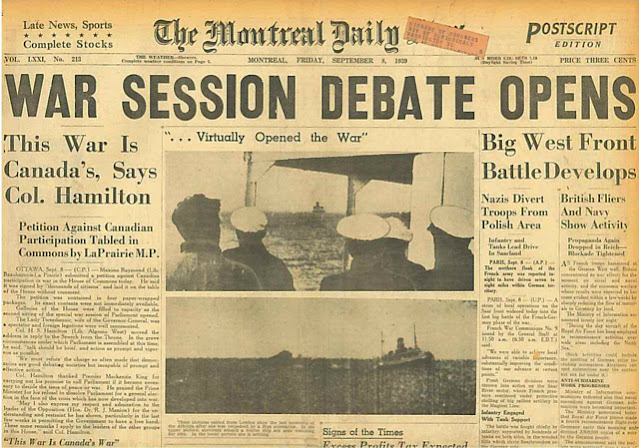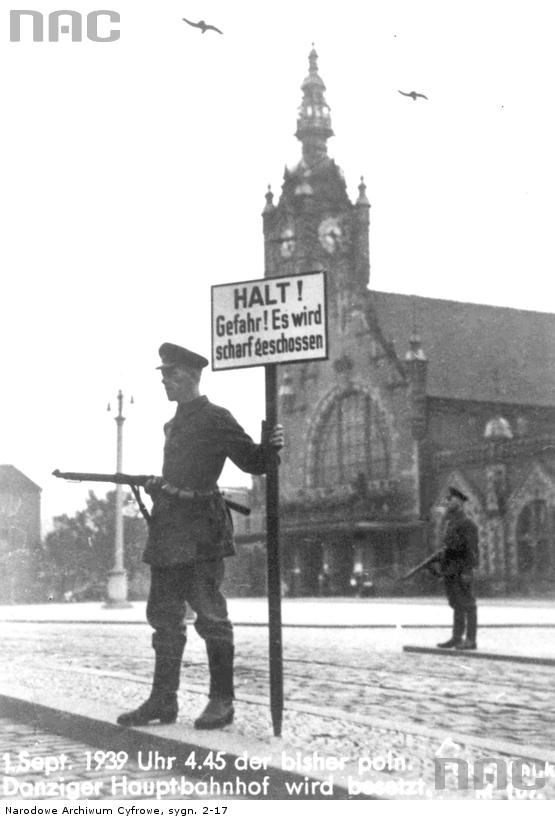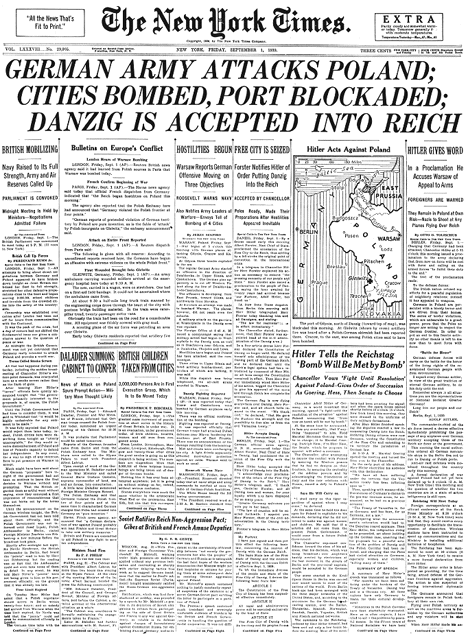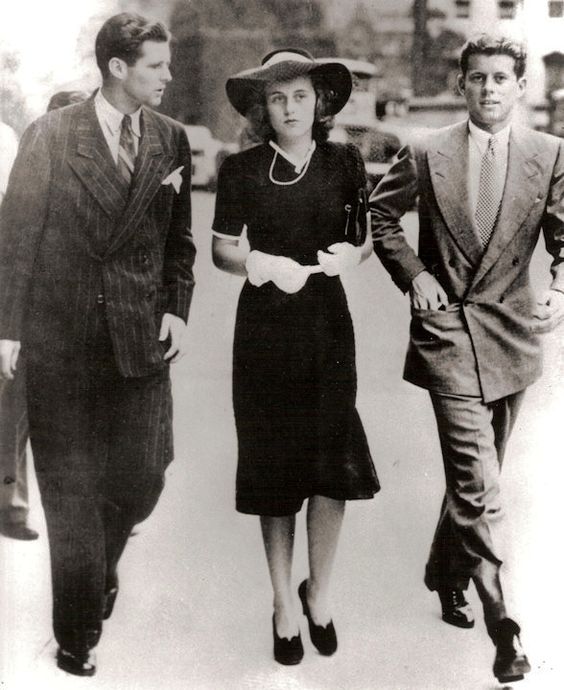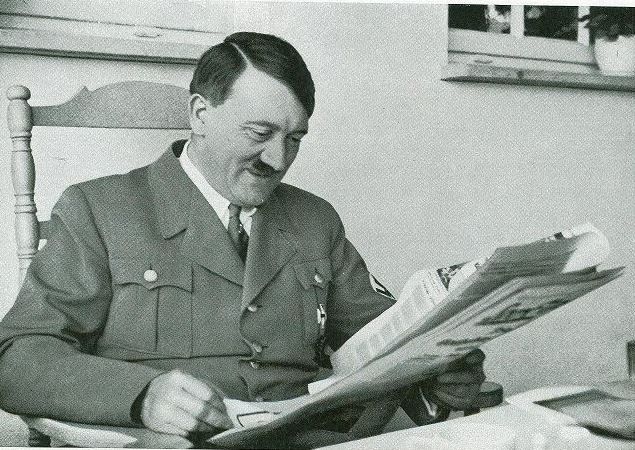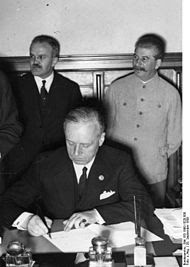Friday 8 September 1939
Battle of Poland: The Germans on September 8, 1939, continue battering against Łomża Fortress, which controls the Narew River. Luftwaffe bombers attack around noon, then the infantry assaults forts no. II and III. Polish artillery is effective, and the Germans retreat at the end of the day.
Heinz Guderian and his XIX Panzer Corps receive orders to advance to Brest-Litovsk, which is in the allocated Soviet zone (see the entry about Ribbentrop below). They are heading south along the line of the Bug River toward Wizna, the scene of fighting by the 10th Panzer Division and and "Lötzen" Brigade.
German troops of the 4th Panzer Division arrive at the Warsaw suburb of Ochota in the southeast. Polish General Czuma, in charge of the city, orders 100,000 civilians to begin digging anti-tank ditches. General Czuma broadcasts somewhat incongruously that "We shall fight to the last ditch!" The Germans claim to have entered Warsaw, which Polish radio denies. The Poles do, however, admit to some retreats in other areas. News reports around the world echo the German claim.
German troops begin attacking Gdynia.
Polish troops at the village of Wola Cyrusowa near Stryków make a stand. The Poles are the Polish Piotrków Operational Group under Gen. Wiktor Thommée, who has replaced a more senior officer who abandoned the army and left for Warsaw. The attacking German forces of the 10th Infantry Division and 24th Infantry Division are slowed, but not stopped.
Other troops of the 10th Infantry Division encircle some 60,000 Polish troops to the west of Radom, south of Warsaw.
German/Soviet Diplomacy: German Foreign Minister Ribbentrop notifies the Kremlin that German forces for tactical reasons will be impinging upon territories assigned to the Soviets under the August Ribbentrop/Molotov Pact.
Western Front: French forces continue advancing timidly in the Saar. The invading force includes some 600 tanks. The Germans have evacuated Saarbrücken of non-essential personnel. General Gamelin is suspicious of the absence of German defensive activity and fears an ambush. Wild rumors are spread by Paris radio that the Germans have rushed six divisions to defend the area. Concerned, Gamelin orders his forces to maintain distance from the Siegfried Line. He also cautiously orders his forces to plan for a withdrawal to the nearby Spicheren Heights in France in the event of an attack. The French remain close to the comforting Maginot Line. The Germans, meanwhile, are just watching the proceedings with scratch forces. Factories in Saarbrücken continue working.
There are rumors of food shortages along the Siegfried Line.
 |
| San Francisco Chronicle, September 8, 1939. |
Air War, Western Front: Curtiss Hawk fighters of l'Armee de l'Air (French air force) meet 5 Bf 109 fighters. They file claims for 2 of the Messerschmitts.
The RAF launches another propaganda drop over Germany, the fourth of the war so far.
Rumors are spreading of transfers of French and British aircraft to Poland.
Battle of the Atlantic: U-38 under the command of Kapitänleutnant Heinrich Liebe sinks the British steamer Manaar.
The British Ministry of Information releases a statement on the war at sea:
It is now palpably evident that Germany is prosecuting an unrestricted submarine campaign against merchant shipping as violent as that on which Germany embarked in 1917, and that the German submarine commanders have been given orders to sink merchant ships on sight and without warning.
This, of course, is in direct contravention of the rules of submarine warfare which were unconditionally accepted by Germany in 1935, for all time and irrespective of the actions of any other Power.
It is also quite clear that German submarines were on their stations on the ocean trade routes, with these orders, several days before war broke out.The statement is correct in all particulars, as the U-boats were sent to sea on 15 August.
War Crimes: German troops entering Bromberg (the German name for the Polish city of Bydgoszcz) claim to find hundreds of civilians slain by Polish snipers. This initiates the "Bloody Sunday" affair.
Meanwhile, in the village of Dąbrowa (near Ciepielów), Oberst Walter Wessel, acting commander of the German 15th Motorized Infantry Regiment, 29th Motorized Infantry Division, orders the execution of about 300 Polish POWs of the Polish 74th Infantry Regiment of Upper Silesia commanded by Major Józef Pelc. Wessel claims that they have been acting as partisans.
British Navy: The Admiralty expands the blockade of Germany. Three protected routes for convoys are established, two out of Liverpool and one from the Thames to the Atlantic. German ships overseas head for neutral ports for internment.
Polish/British Diplomacy: A Polish mission headed by General Novid-Neugebauer arrives in London.
German Homefront: Patients are "voluntarily" evacuated from hospitals to free up room for war casualties.
United States Government: President Roosevelt declares a limited national emergency and authorizes increases in the armed forces. A sum of $500,000 is authorized for the return of US citizens from the war zone. He reiterates the country's neutral status, and these measures are designed to protect it.
American Homefront: Bob Feller of the Cleveland Indians becomes the youngest pitcher to win 20 games in a season.
September 2, 1939: Danzig Annexed
September 3, 1939: France, Great Britain Declare War
September 4, 1939: First RAF Raid
September 5, 1939: The US Stays Out
September 6, 1939: Battle of Barking Creek
September 7, 1939: Polish HQ Bugs Out
September 8, 1939: War Crimes in Poland
September 9, 1939: The Empire Strikes Back
September 10, 1939: The Germans Break Out
September 11, 1939: Battle of Kałuszyn
September 12, 1939: The French Chicken Out
September 13, 1939: The Battle of Modlin
September 14, 1939: Germany Captures Gdynia
September 15, 1939: Warsaw Surrounded
September 16, 1939: Battle of Jaworów
September 17, 1939: Soviets Invade Poland
September 18, 1939: Lublin Falls
September 19, 1939: Germans, Soviets Hook Up
September 20, 1939: the Kraków Army Surrenders
September 21, 1939: Romania Convulses
September 22, 1939: Joint Soviet-German Military Parade
September 23, 1939: The Panama Conference
September 24, 1939: The Luftwaffe Bombs Warsaw
September 25, 1939: Black Monday for Warsaw
September 26, 1939: Warsaw on the Ropes
September 27, 1939: Hitler Decides to Invade France
September 28, 1939: Warsaw Capitulates
September 29, 1939: Modlin Fortress Falls
September 30, 1939: Graf Spee on the Loose
2021
September 1939
September 1, 1939: Invasion of PolandSeptember 2, 1939: Danzig Annexed
September 3, 1939: France, Great Britain Declare War
September 4, 1939: First RAF Raid
September 5, 1939: The US Stays Out
September 6, 1939: Battle of Barking Creek
September 7, 1939: Polish HQ Bugs Out
September 8, 1939: War Crimes in Poland
September 9, 1939: The Empire Strikes Back
September 10, 1939: The Germans Break Out
September 11, 1939: Battle of Kałuszyn
September 12, 1939: The French Chicken Out
September 13, 1939: The Battle of Modlin
September 14, 1939: Germany Captures Gdynia
September 15, 1939: Warsaw Surrounded
September 16, 1939: Battle of Jaworów
September 17, 1939: Soviets Invade Poland
September 18, 1939: Lublin Falls
September 19, 1939: Germans, Soviets Hook Up
September 20, 1939: the Kraków Army Surrenders
September 21, 1939: Romania Convulses
September 22, 1939: Joint Soviet-German Military Parade
September 23, 1939: The Panama Conference
September 24, 1939: The Luftwaffe Bombs Warsaw
September 25, 1939: Black Monday for Warsaw
September 26, 1939: Warsaw on the Ropes
September 27, 1939: Hitler Decides to Invade France
September 28, 1939: Warsaw Capitulates
September 29, 1939: Modlin Fortress Falls
September 30, 1939: Graf Spee on the Loose
2021
